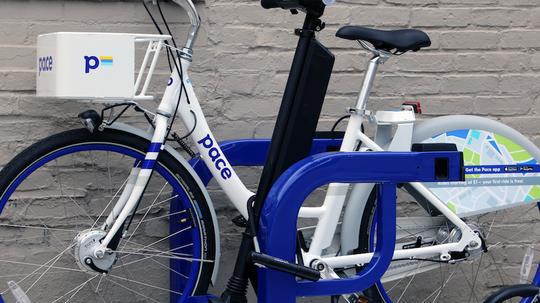
Boston-based Zagster, the parent company of bike-sharing company Pace, is launching what it is calling Pace Parking, a new parking platform for dockless bikes, electric bikes and scooters.
The company announced Thursday that Pace Parking platforms are now available in Chicago, Austin and Bloomington, Ind.,—all cities with “lock-to” regulations. The regulations, which have been controversial, require that dockless bikes be locked to a bike rack or other stationary object with a traditional bike lock while not in use, which according to some critics, defeats the purpose of the bikes being dockless.
The city of Chicago is facing this problem right now in the midst of its dockless bike-sharing pilot program, which is being managed by the Chicago Department of Transportation. As part of the pilot, three dockless bike companies, including Pace, Beijing-based Ofo and San Mateo, Calif.-based LimeBike, are operating on the city’s South Side.
To avoid the chaos other cities have endured during a dockless bike rollout, Chicago has required that companies with more than 50 bikes operating in the city have to be equipped with lock-to technology.
However, as the pilot stands now, every single dockless bike operating in the city after July 1 will have to be equipped with lock-to mechanisms, according to Michael Claffey, a spokesperson for CDOT. So far, only Pace has the bike infrastructure to continue its business after the beginning of next month, and the new parking platforms are an extension of that.
“The lock-to technology is very important because it cuts down on the issues to do with dockless, like theft and vandalism,” said Dave Reed, expansion manager for Pace. “We’re hoping to deploy more bikes once there’s more bike racks installed. We’re interested in expanding.”
Both Ofo and LimeBike, whose bikes don't come with lock-to tech, told Chicago Inno that they have asked the city to reconsider its lock-to policy, but a final decision has not been made yet. Claffey said in a statement to Chicago Inno that CDOT is “reviewing the requests to reconsider the July 1 deadline,” but that at this time, there is no change to the current rules of the pilot program.
“[Dockless bikes] really enable people to use these bicycles to go anywhere they need to go in a city,” said Marco McCottry, the head of North American operations at Ofo. “When you start requiring locking mechanisms, that starts to put restrictions in place that prevents that because not every single city street has the infrastructure set up to lock a bicycle.”
Since the introduction of dockless bike-sharing, cities across the globe have struggled to keep them organized. Dockless bikes, which unlike Chicago’s Divvy bikes—aren’t stored at docking stations when they aren’t being used—have caused problems in cities like Paris and Amsterdam, where bikes have been cluttering public spaces, and getting damaged or stolen.
Chicago’s dockless bike pilot deployed about 300 bikes from all three companies throughout 10 wards on the city’s South Side, making them available between 79th and 138th Streets, Pulaski Road and the Chicago Skyway. As part of the pilot, the companies are meeting with CDOT and other city departments on a monthly basis to discuss the progress, and the first of those meetings happened earlier this month. The first dockless bike-share program in Illinois originally launched in April when LimeBike brought its service to Rockford.
Though dockless bike-sharing has been difficult to introduce in some areas, investors are putting their money on the new method of transportation. According to Crunchbase, Ofo has raised $2.2 billion in venture capital funding, LimeBike has raised $383 million and Zagster has raised more than $31 million.








